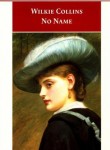Cocktail Talk: No Name, Part I
 First published in serial form in 1862/1863, No Name is not the book name (see what I did there!) that first pops up when one thinks of Mr. Wilkie Collins; instead, it’s The Moonstone, and then The Woman in White. Both of which have also had recent television adaptions. It makes some sense, too, especially as The Moonstone is in many ways arguably (gently, cause there is no need for a ruckus) the first, or one of the first, detective novels, kicking off a massive industry, and The Woman in White has a little of that action, too. However! Collins wrote many more novels, some good, some not as good, and strongly in the good column is No Name. It had been, maybe, twenty-odd years since I read this the first time, and on the second reading recently I was struck by just how good it is, and left wondering why more haven’t taken it up. It has, as you might expect, a fair dollop of Victorian melodramatics – meaning, lots of cliff’s edges or “oh that didn’t happen” ramped up moments, like a silent movie in a way, or like a fair amount of modern movies now that I think about it – and gets wordy at over 500 pages. But the story/stories of two sisters (Magdalen and Norah Vanstone) abandoned when their parents die, and left none of their inheritance due to the ridiculous legality of the times, and how they deal with it and the loss of standing and fortune (not to mention grief, degradation, all that) is done quite well, and gives us a heroine (Magdalen) that many readers at the time weren’t fond of, but which I quite liked in her “do whatever it takes” and “I’m not going to sit in a place others tell me to” attitude. It could, I think, also make a swell miniseries! Plus, it was Collins’ pal Charles Dickens favorite (of the Collins canon), and has a couple nearly Dickensian characters, including the rascally Captain Wragge, and his nemesis, the calculating Mrs. Lecount, who below gives us – along with cruel fool Noah Vanstone – our first of three Cocktail Talks from the book.
First published in serial form in 1862/1863, No Name is not the book name (see what I did there!) that first pops up when one thinks of Mr. Wilkie Collins; instead, it’s The Moonstone, and then The Woman in White. Both of which have also had recent television adaptions. It makes some sense, too, especially as The Moonstone is in many ways arguably (gently, cause there is no need for a ruckus) the first, or one of the first, detective novels, kicking off a massive industry, and The Woman in White has a little of that action, too. However! Collins wrote many more novels, some good, some not as good, and strongly in the good column is No Name. It had been, maybe, twenty-odd years since I read this the first time, and on the second reading recently I was struck by just how good it is, and left wondering why more haven’t taken it up. It has, as you might expect, a fair dollop of Victorian melodramatics – meaning, lots of cliff’s edges or “oh that didn’t happen” ramped up moments, like a silent movie in a way, or like a fair amount of modern movies now that I think about it – and gets wordy at over 500 pages. But the story/stories of two sisters (Magdalen and Norah Vanstone) abandoned when their parents die, and left none of their inheritance due to the ridiculous legality of the times, and how they deal with it and the loss of standing and fortune (not to mention grief, degradation, all that) is done quite well, and gives us a heroine (Magdalen) that many readers at the time weren’t fond of, but which I quite liked in her “do whatever it takes” and “I’m not going to sit in a place others tell me to” attitude. It could, I think, also make a swell miniseries! Plus, it was Collins’ pal Charles Dickens favorite (of the Collins canon), and has a couple nearly Dickensian characters, including the rascally Captain Wragge, and his nemesis, the calculating Mrs. Lecount, who below gives us – along with cruel fool Noah Vanstone – our first of three Cocktail Talks from the book.
“The man has been drinking, sir,” said Mrs. Lecount. “It is easy to see and to smell that. But he is evidently used to drinking. If he is sober enough to walk quite straight–which he certainly does–and to sign his name in an excellent handwriting–which you may see for yourself on the Will–I venture to think he is sober enough to drive us to Dumfries.”
“Nothing of the sort! You’re a foreigner, Lecount; you don’t understand these people. They drink whisky from morning to night. Whisky is the strongest spirit that’s made; whisky is notorious for its effect on the brain. I tell you, I won’t run the risk. I never was driven, and I never will be driven, by anybody but a sober man.”
–Wilkie Collins, No Name





















